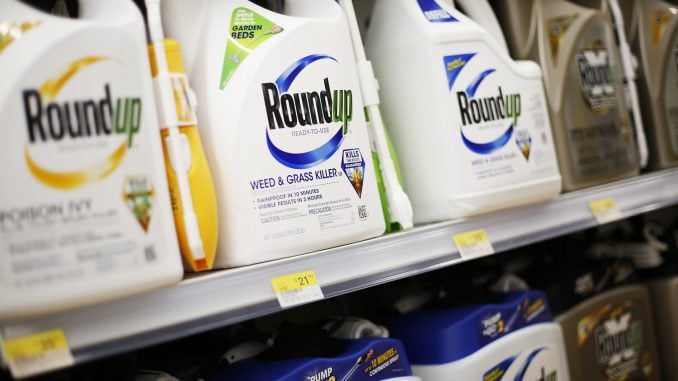
RALEIGH — Nothing gets rid of that stubborn patch of grass in the crack in your driveway easier than a squirt or two of Roundup, but the active chemical that does the heavy lifting has far-ranging uses and has faced its share of criticism.
Glyphosate, discovered in 1970, has evolved into much more than a weekend weedkiller. Missouri-based Monsanto, along with other companies that utilize the world’s most-used pesticide, has developed genetically engineered seed that is resistant to the chemical, meaning farmers can spray fields with glyphosate, wiping out unwanted plants without harming their crops.
“It’s certainly a popular product,” said Mitch Peele, senior director of public policy at North Carolina Farm Bureau.
But in 2015 the International Agency for Research on Cancer — known as IARC and part of the World Health Organization — determined glyphosate was a “probable human carcinogen” that could cause blood cancers. However, those findings are now in question.
The rise in genetically modified seeds, called GMOs, has led to skepticism over their safety, helping usher in the billion-dollar organic food era that has often been marketed as Big Ag vs. small family farmers.
The classification by the IARC two years ago was a blow to Monsanto’s stance that glyphosate is safe, even though several other groups, including the U.S.’s Environmental Protection Agency, deemed it so.
Lawsuits like a 184-plaintiff case in California claim the product causes cancer, and the IARC’s labeling of glyphosate as a carcinogen gave footing to critics.
However, last week Reuters published a story revealing an epidemiologist from the National Cancer Institute knew years-old research determined glyphosate showed no evidence of causing cancer, but the results were not published and therefore not considered when he met with the IARC about the chemical.
That research came from the Agricultural Health Study, which has followed more than 89,000 farmers and their spouses in North Carolina and Iowa who have participated in the research since 1993. It has found links to non-Hodgkin lymphoma in farmers who used certain chemicals, but not when using glyphosate, according to a March deposition by Aaron Blair, the scientist who met with the IARC without presenting the findings.
A 2006 update from the study found spouses of farmers had slightly less incidence of breast cancer compared to other women in North Carolina and Iowa, and the chemical most used by them was glyphosate. A 2009 update did show women have a higher risk of asthma with allergies if they used several pesticides, including glyphosate.
“It’s a long-term study where they’ve looked at people, actual farmers,” Peele said. “So it’s real-world data, so that’s always good when you have real-world data that you can cite in those type of studies.”
Peele was also quick to point out the IARC’s classification of glyphosate as a “probable carcinogen” — even before the revelations about Blair’s deposition — represented just one opinion of many, with most determining the chemical was safe.
“When you’ve got EPA and several other regulatory bodies here in the U.S. that are doing that sort of thing already, if they had come out in addition to this international body under the World Health Organization, then I think that’s something entirely different,” he said. “But this is just one out of several that are looking at that and I think you have to look at things in totality.”
At this juncture, that totality points to glyphosate as safe and the IARC’s determination as an outlier, especially after the recent revelations about the Agricultural Health Study’s unpublished findings.
“I don’t know what the policy is for the IARC going back and reviewing data based on new information,” Peele said. “So maybe that will take place and maybe they will come to the findings of so many other regulatory bodies like the EPA, the European Food Safety Authority and this European Chemicals Agency and others and agree that it should not be classified as a probable carcinogen.”
Glyphosate’s use — in your driveway and in farms across the world — has more than doubled in the last decade compared to the previous decade, so research like the ongoing Agricultural Health Study will continue to look at how the chemical impacts the health of now older farmers.
“Farmers need critical crop-protection tools, so we’ve been supportive of those efforts,” Peele said. “But we have also said all along we want to make sure the products they’re using are safe and have gone through all the regulatory checks and balances and all.”



